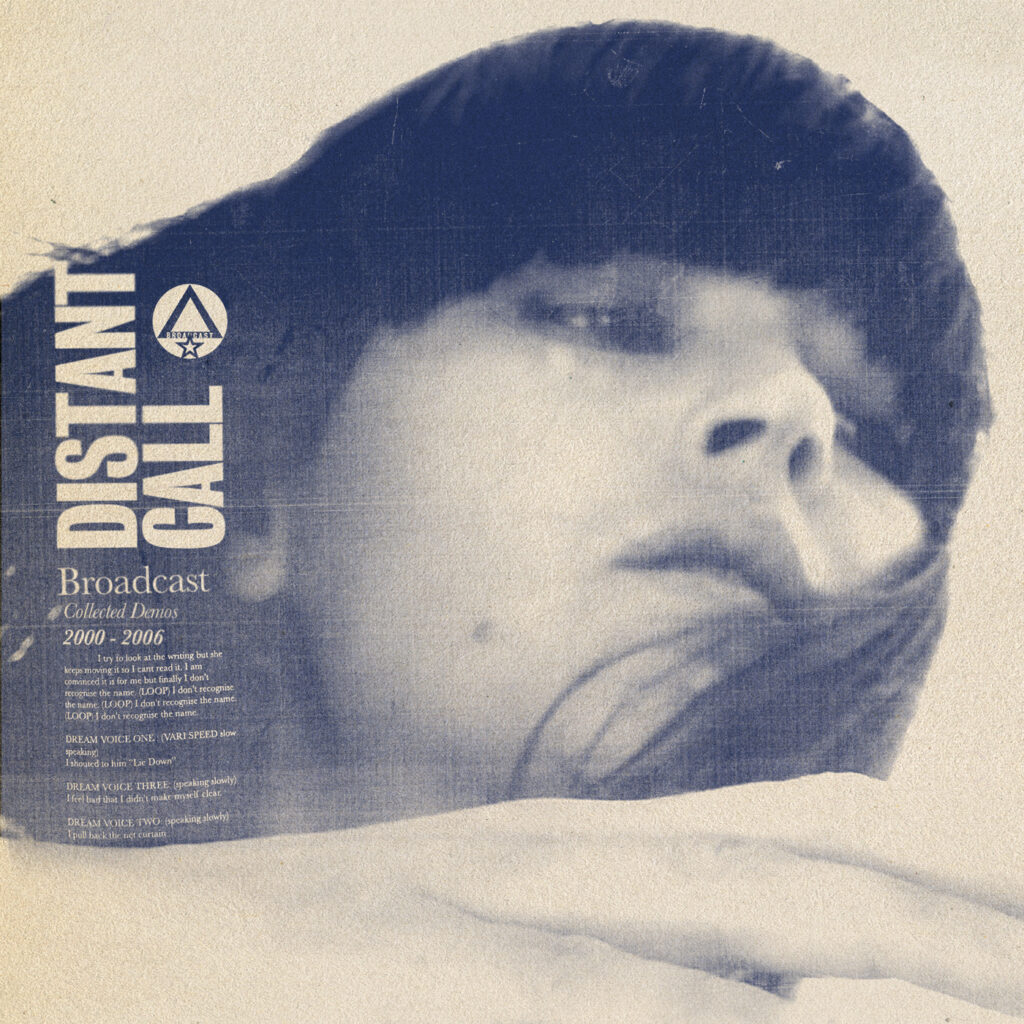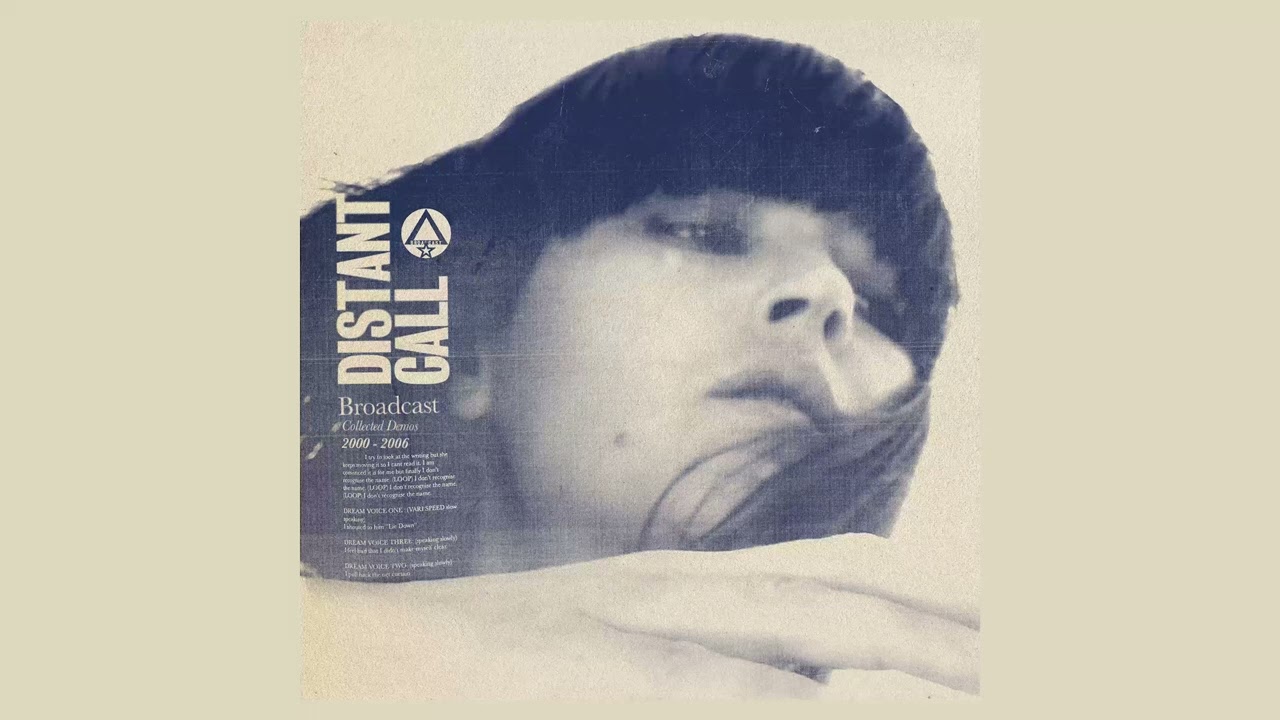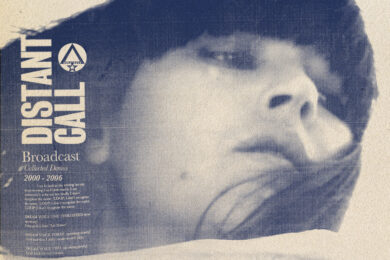Announced as Broadcast’s last release, Distant Call opens with appropriate poignancy, with a demo version of ‘Tears In The Typing Pool’ from Tender Buttons, the band’s third album. Coloured by dreamy melancholy, the song centres on the idea of letting go – the key theme to its parent album, which was released shortly after the death of singer Trish Keenan’s father.
Delivered through the pink noise of four-track tape, the lulling ballad takes one to a fluid temporal realm where serotinal 60s baroque pop fragility merges with the urban balladry of Elliott Smith. The undulating pace, punctuated by soft downstrokes on acoustic guitar, is steady, just like the ticking clock or the passing time.
Distant Call follows May’s Spell Blanket – Collected Demos 2006-2009, which looked into what would be the collective’s fifth album, built out of the demos that Keenan left after her tragic passing in 2011 at the age of 42. The singer had contracted pneumonia during the band’s tour in Australia. Though the band understandably ceased to be, Broadcast co-founder James Cargill announced that the demos left by Trish would form a new album. The resulting record was built of sonic ephemera from seance-like recitations and sketches, featuring everything from cut-up lyrics to more developed compositions that showed a quirky psych and freak-folk flavour. Distant Call, however, reflects on previously released tracks as relics from an unreachable and, indeed, distant past. The ghostly sound of demo recordings emphasises the record as a farewell to the band and a memorial to Keenan. Notably, Distant Call is released on the singer’s birthday, 28 September.
Although the word ‘nostalgia’ doesn’t reflect the purpose of this release, the compilation does bring to mind some related theoretical frameworks. In her book The Future Of Nostalgia, Svetlana Boym suggested that the phenomenon can occur as either restorative (“[it] stresses nóstos (home) and attempts a transhistorical reconstruction of the lost home”) or reflective (“thrives in álgos, the longing itself, and delays the homecoming—wistfully, ironically, desperately”). The image of the distant call in the release’s name resonates with that longing for what is elusive. It is also a quintessence of ‘broadcast’ as a concept – a signal from a remote and unseen source.
Trish Keenan’s softly intoning vocals were the defining stylistic element of Broadcast’s sound, where pagan folk sensibility meets quirky psychedelia. Originally from The Future Crayon, ‘Still Feels Like Tears’ is more instant, channelling the vulnerability and tenderness of Vashti Bunyan’s Just Another Diamond Day and nursery rhymes. The combination of psych and folk is best captured on beguiling ‘Come Back To Me’, a hypnotic arpeggio-led chant of a song, bringing to mind The Mock Turtles’ cover of ‘The Willow Song’ from The Wicker Man. This is one of the two previously unheard tracks. The second is ‘Please Call To Book’, recorded by Keenan in the wake of the Let’s Write A Song project where Broadcast fans were encouraged to send lyrics on a postcard.
Whilst it is somewhat overused in the contemporary culture framework, the term hauntology inevitably comes to mind for those entering the realm of Broadcast. Having initially emerged as a vehicle for their appreciation for the futuristic music of the 1960s, Broadcast boldly traversed temporal dimensions. Both Cargill and Keenan had attended a psychedelic revival night at Birmingham’s Sensateria Club where the two heard the first and only album by The United States and America, originally released in 1968 and later described by Keenan as a “bible”.
The core of Distant Call, however, is the material from the band’s most mature albums Haha Sound and Tender Buttons. Both were more experimental and less retro-oriented than their debut Noise Made By People, making references from John Barry to the Doctor Who soundtrack. Talking to Stool Pigeon, Keenan said that unlike the first album “Ha Ha Sound was like a jewellery box, full of sparkling things”. It is therefore remarkable to hear charmingly plain versions of initially lush sounding ‘O How I Miss You’ and the dizzyingly ecstatic waltz of ‘Ominous Cloud’.
Still, the minimalist folky sound recalls another earlier project of Trish Keenan – her duo Hayward Winters also featuring Birmingham musician Jude Owens. Given that the narrative of folk music disobeys the concept of time, this too is intrinsically ghostly. The haunting nature of these stripped-down demo versions is reinforced by the spectral presence of the singer, whose persona has inevitably undergone mythologisation akin to other prematurely deceased artists. Keenan’s interest in the occult, her unusual childhood (in an interview with Ben Cardew of Stool Pigeon the artist said that she had been brought up by a sex worker) and her retromaniac stance come to the fore. It’s interesting to see how the media’s image of Broadcast transformed after Keenan’s passing – changing from cult band to something “quietly beguilingly influential,” as The Guardian’s obituary of Keenan put it, citing tributes from Graham Coxon and The Decemberists’ frontman Colin Meloy.
Nevertheless, in juxtaposition with the complexity of Broadcast’s studio albums, Distant Call is a reminder of how different the image an artist offers through their music can be from their personality. “Keenan would send her friends CDs of music she’d discovered or TV shows she had enjoyed”, wrote Stephen Worthy in The Guardian a few days after the singer’s death. “Life was an exercise in discovery, and she wanted to share it with everyone”. After her passing, a link to a freshly-made compilation of psych and world music was posted to the public on Twitter. Keenan had made it for a friend who received it before the band went to Australia. The existence of these demos suggests that she treated her audience, too, as friends with whom she was eager to share, whether via songs, memories or her physical presence.




